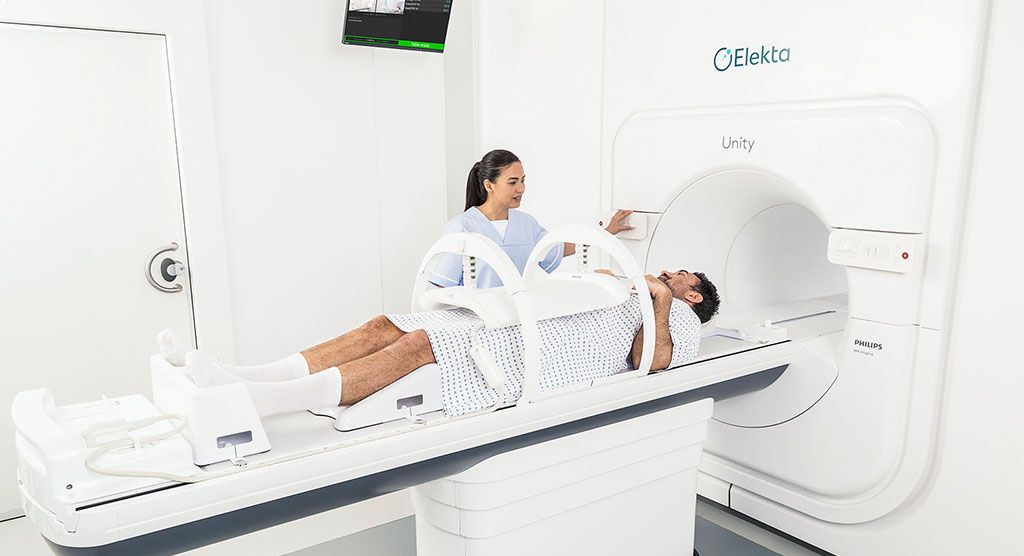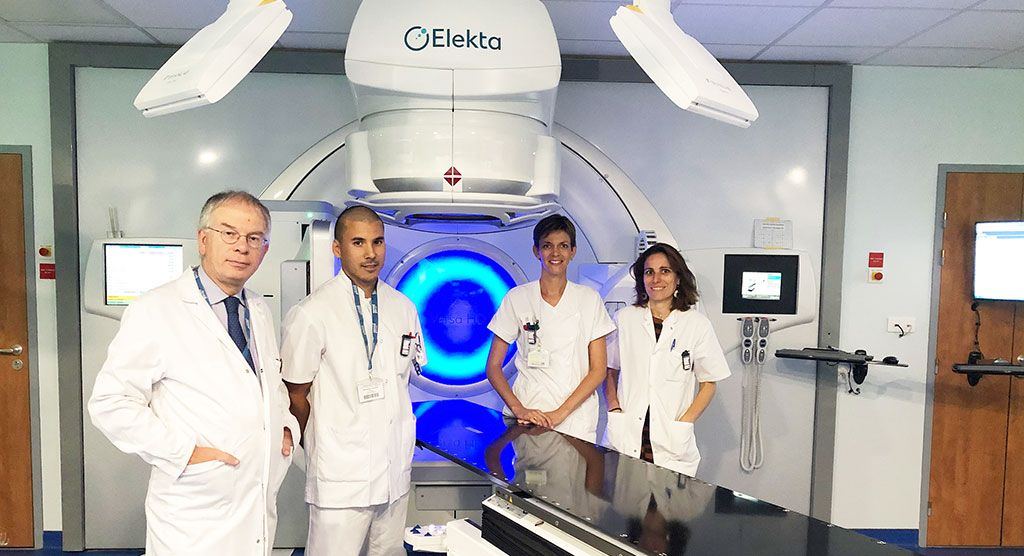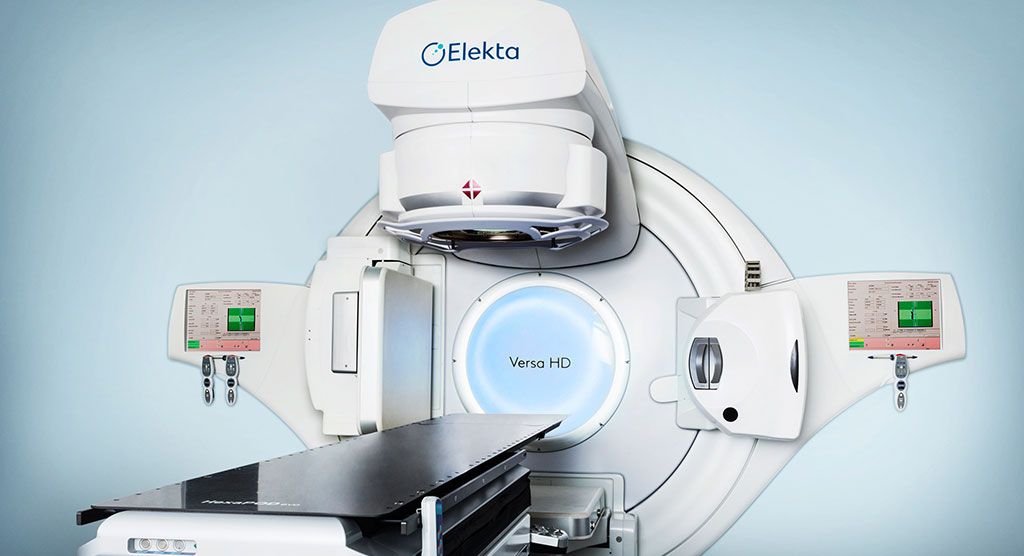East Jerusalem hospital a vital radiotherapy resource for patients in Gaza and the West Bank

Since 2005, Augusta Victoria Hospital has served Palestinians from areas lacking radiation therapy technology

The 1948 Arab-Israeli war set the stage for a decades-long healthcare crisis that has impacted Gaza and the West Bank, territories settled by Palestinian refugees and displaced persons. Within the boundaries of the two areas, the combined population of 5.5 million inhabitants has no access to radiation therapy services.
“Before the establishment of Augusta Victoria Hospital’s [AVH] radiotherapy program in 2005, Palestinians in the West Bank and Gaza had to travel to other countries, such as Egypt and Jordan, for radiotherapy,” says radiation oncologist Fadi Atrash, MD, head of the radiation therapy department. “There was no control of the kind of treatment they were receiving or of the treatment quality. Due to geopolitical issues preventing their installation, there still are no linacs in the West Bank and Gaza.”

The first step to improve that situation occurred in 2005, when AVH transformed itself from a general hospital into a comprehensive cancer center. With a single Siemens linac and using only 2D techniques, AVH steadily increased its case volume and introduced 3D conformal radiotherapy in 2010. To address the ongoing demand, AVH in 2009 purchased a Varian linac (Trilogy), which began treating patients in 2011 employing more sophisticated techniques such as IMRT, rotational arc therapy and, for select lung and brain cases, fractionated stereotactic radiation therapy.
After several years, Dr. Atrash and his colleagues decided to establish an official AVH stereotactic radiation therapy program, the centerpiece of which is Elekta’s Versa HD™ system installed in late 2018.
“If you want to start a stereotactic radiotherapy program you have to have a state-of-the art machine, which in my opinion is Versa HD.”
“If you want to start a stereotactic radiotherapy program you have to have a state-of-the art machine, which in my opinion is Versa HD,” he says. “It provides all the tools you need, such as Agility™ MLC beam shaping, Symmetry™ 4D imaging at the time of treatment and High Dose Rate delivery. In addition, we acquired the HexaPOD™ evo RT system for precise positioning correction and Monaco® treatment planning, which I feel is the best planning system.”
The most common indication at AVH is breast cancer, for which clinicians use the Canadian hypofractionation schedule of 42.5 Gy in 16 fractions, with a 10 Gy boost fraction if needed. Other frequent indications are brain tumors and head-and-neck, lung and rectal cancers, with fewer numbers of prostate cancer cases. For all indications, treatment intent has steadily shifted from palliative to curative.
“When we started the radiotherapy service, about 60 percent of our patients were receiving palliative radiation. Today, only 25 to 30 percent of cases are palliative.”
“When we started the radiotherapy service, about 60 percent of our patients were receiving palliative radiation,” he says. “Today, only 25 to 30 percent of cases are palliative.” Even more remarkable is the impact that AVH has had for breast cancer patients in Gaza and the West Bank.
“Before creating the department, 90 percent of the patients had a total mastectomy,” Dr. Atrash notes. “After introducing our services and our updated team, there has been a dramatic effect in how patients are treated at other hospitals. More and more of these women are receiving breast-conserving treatment because of the addition of radiation in their treatment plan, which had led to more patient-friendly surgical interventions, such as a lumpectomy. Today, mastectomy is carried out in no more than 20 percent of cases.”
Because virtually all West Bank and Gaza patients needing radiation therapy receive treatment at AVH, the radiation therapy department’s case volume shows no sign of abating. Clinic hours run from 8:00 am to 9:00 pm in two shifts, with treatment of 45 patients daily on the Trilogy system, 35-40 patients per day on the Versa HD (all more complex SRS cases) and – on a newly acquired Elekta Synergy® system – 50 patients each day. With a staff of four radiation oncologists, four medical physicists, a dosimetrist and 15 RTTs, AVH delivered radiotherapy to 1,514 new patients in 2019.
To streamline its busy clinic day, AVH uses MOSAIQ® Oncology Information System, which Dr. Atrash considers an important tool to connect the different areas of their department, giving them a better view of the complete workflow.
“With MOSAIQ, we are setting the base of better analysis and evaluation of our work in the future that supports our vision of quality improvement,” he says.
“Our plan is to be the radiation therapy leader in Palestine – in capacity, professionalism and technology.”

“Our plan is to be the radiation therapy leader in Palestine – in capacity, professionalism and technology,” Dr. Atrash says. “But even more important, we want to lead in radiation therapy quality. To that end, we started a quality review system in the department. It’s not enough for a center to simply provide radiation therapy, the treatment quality must be at the highest level. In addition, we will continue to train our radiation oncologists, physicists and technicians on best practices to ensure that level of quality.
“Looking toward the future, we plan to introduce high dose rate brachytherapy in 2020, beginning with gynecological indications first, then prostate,” he adds. “We want to lead technologically as well, so the MR-Linac could even be a possibility here.”
According to Habib Nehme, Elekta Vice President, Turkey, India, Middle East and Africa, Elekta is rapidly building the local infrastructure for precision radiation medicine in these emerging markets. The special focus in the Middle East is increasing radiotherapy access for Palestinians in the West Bank and Gaza.
“Our vision is precision radiation medicine for all,” he says. “With our 250 employees in these regions and a network of 50 partners with more than 120 qualified engineers and education specialists, Elekta is working tirelessly to decrease disparities between developed and developing markets, in terms of access to radiation therapy and cancer treatment.”






